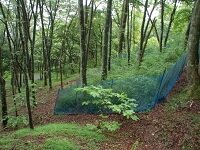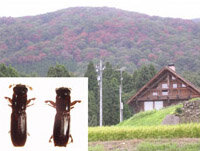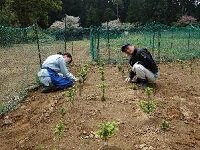Laboratory of Forest Ecology and Functional Biology
The Laboratory of Forest Ecology and Functional Biology conducts comprehensive and interdisciplinary research on the ecology and functions of forest organisms from both basic and applied perspectives. We employ a variety of approaches, ranging from micro to macro scales, and from laboratory work to field studies. Our aim is to establish management systems for healthy forest ecosystems by elucidating the ecology and functions of forest organisms. Additionally, we seek to contribute to human society, both directly and indirectly, through our research on the responses of organisms and ecosystems to environmental changes, the conservation of biodiversity, the management of pests and diseases, and the exploration and development of technologies for utilizing valuable biological resources.
Major theme
- Spatial and temporal population dynamics of forest defoliating insects and their biological interactions
- Influences of global warming on forest insects
- Wood boring insects and forest decline
- Genetic dissection of local adaptations in forest trees
- Response against heat stress of boreal trees in the age of global warming
- Ecological consequences of deer herbivory on biodiversity and biological interactions in forest ecosystems
- Ecosystem functioning of rhizosphere organisms and microbes in plant-soil feedback systems
- Molecular mechanisms of mass flowering in bamboo
- Expression analysis of flowering genes in Abies sachalinensis
- Long term dynamics and diversity of forests
- Stand development of forests that have been disturbed by a super typhoon
- Stand structure and dynamics of wave-regenerated forests
- Ecology and behavior of forest dwelling bats
- Defense responses and resistance mechanisms of trees against pathogens and their application to forest health.
- Mechanism of the blockage of water conduction in trees with wilt disease and determinants of pathogenesis
- Process of deserted mine reforestation and the role of symbiotic microorganisms, and improvements to reforestation
- Inhibiting factors of tree regeneration and improvement of regeneration
- Relationship between responses of trees against biotic/abiotic stress and gene expression/metabolites
- Mechanisms of useful metabolites formation of woody plants and their effective production
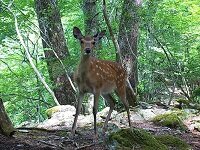
- Ecological consequences of deer herbivory on biodiversity and biological interactions in forest ecosystems
- Exclosure installed to prevent deer herbivory in UTCF
- Platypus quercivorus and the incidence of Japanese oak wilt
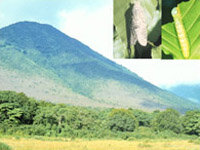
- Forest defoliation caused by population outbreaks of the beech caterpillar, Syntypistis punctatella
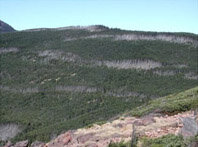
- Fir wave (Shimagare): a patterned vegetation caused by high prevailing winds
- Transplant experiments of three boreal conifers in UTCBF

- Isolation of pathogenic fungi from diseased leaves

- Reforestation experiment of a deserted asbestos mine

- Wood decay of living trees - a study of defense responses and development of nondestructive detection methods

- The search for useful constituents of woody plants by instrumental analysis <Heartwood constituents of sandalwood>
Staff
- Naoto KAMATA (Professor)
- Shigehiro KAMODA (Associate Professor)
- Susumu GOTO (Associate Professor)
- Dai KUSUMOTO (Lecturer)
- Dai FUKUI (Lecturer)
- Toshihide HIRAO (Lecturer)
- Tadashi MAEHARA (Assistant Professor)
- Daisuke SAKAUE (Assistant Professor)
- Hiroki INOUE (Assistant Professor)
- Yoko HISAMOTO (Assistant Professor)
- Ryo NAKAHATA (Assistant Professor)

